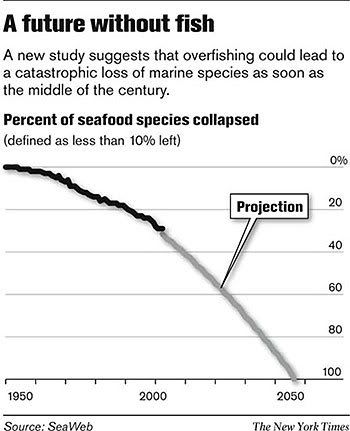Startling new study reveals that only 10% of fish and sea life remains around the globe.

(RG)
The scientific community has released data that 90% of fish and other ocean life have died since the beginning of the last century. The data shows that 18% of ocean species have been reduced in number by more than 90% and 7% of ocean life has already become completely extinct with not one survivor of the species.
Most startling is the projection that, by the year 2048, all dominant fish species and most sea life will be completely extinct. Over 70% of the earth's surface is covered by water. With the annihilation of life in the ocean, the global ecosystem would begin to break down. Ocean species filter toxins from the water and protect shorelines. Species, such as bears, that depend on fish for survival have already been facing immediate extinction. Many human communities also depend on seafood and scientists fear that the mass extinction will trigger a cascade reaction among all the food chains on the planet.

Scientists and criminologists alike have been trying to warn the general public for years that this was coming. Global warming has led to the collapse of numerous sea ecosystems in recent years, from the bleaching of the coral reefs, former home to millions of species of fish, and sea plants that sea life require for oxygen and food. The recent data suggests that over-fishing by humans and man-made pollution are the main culprits in the depletion of ocean life and that the elimination of both may save the global fish population.
Most of the earth's oxygen supply comes from plant life in the ocean that depends on a delicate balance. The removal of fish and other sea life from the global sea ecosystem could trigger a global atmospheric collapse by the mid century. Scientists are still debating as to the fate of the human species by then.
Researcher Nicola Beaumont, PhD, of the Plymouth Marine Laboratory, U.K., noted in a news release that, "This isn't predicted to happen. This is happening now."
"If biodiversity continues to decline, the marine environment will not be able to sustain our way of life. Indeed, it may not be able to sustain our lives at all," Beaumont adds.
Despite these findings, scientists claim to be optimistic that humans can prevent this catastrophe. According to these scientists, it's not too late if the human race takes immediate action now. A shutdown or vast restricting of human fishing and consumption of seafood coupled with removal of toxic pollutants could replenish the earth's fish population within ten years according to experts in the field of sea life. However, some cynics are skeptical that larger nations such as the US and China will even acknowledge this need for restrictions. Some fear that major global action will not begin until it is too late. With mass extinction now a daily fact of life, inaction is not an option.
When asked how much they would be willing to sacrifice in their daily lives to save all life on earth, many Americans were still unwilling to make any inconvenient changes. Automobiles have gone from a luxury to a perceived necessity in the US and a ban on all personal automobile travel is out of the question to most Americans and US economists. Despite the enormous health benefits of fish consumption, a buildup of mercury, caused by coal burning plants in the US, has led to a slight decline in seafood consumption in the US. Fish "farming" may improve along with technology the would eventually be able to extract and concentrate Omega 3 fatty acids from other sources, making the transition away from human fishing smoother. However, while countries such as Japan have made great strides in progression toward hybrid vehicles and mass transit, the world's largest polluters show little to no sign of moving away from the internal combustion engine.
With the global human population nearing 7 billion, half of all other species are expected to face extinction by the middle of the century unless dramatic changes occur within this decade. According to the Rogue General, "We're on a mission to save the world. It's sad that it had to come to this, but everything must change now. We can't go on living our complacent separate little lives. We need to work together to eliminate the burning of fossil fuels and coal and reduce the burden on the earth and its food supply by regulating global human birthrates. It sounds horribly inhumane to suggest something that China has revealed to have dire problems of its own, but we let it go this far. If we don't control the human population, then we can only hope for a massive pandemic to kill off a large portion of the human species in order to save the entire planet. Now which choice sounds more humane?"
What Changed? The original articles simply stated that there would be no more fish or sea life for humans to eat.
















No comments:
Post a Comment